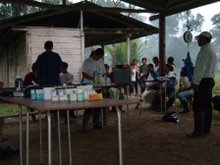I was reflecting on Dr. Shahi's urging us to approach global health with empathy, and one of the things that I didn't mention in my first post on the Mondana community in the rainforest is the roadblocks that FUNEDESIN, the founding organization, had to overcome to get children to come to the school. Parents are reluctant to send their children to school, not because they are against education, but for various reasons. Some families live deep inside the forest ("bien adentro") and it would take a good two hours to get to the school. Other families have so many children that they need the older ones to help care for the younger ones. They rely on their older children for help, and can't afford to lose that pair of hands for 8 hours each day. Still others have no way to pay for an education.
FUNEDESIN designed a successful school with full enrollment (and a waiting list to boot) by taking all these factors into consideration. Families don't pay tuition. Instead, they pay with corn, which the teachers actually eat. They are also given nutritious meals (there are much fewer fish in the Napo river due to oil company activity...plantains comprise a large portion of the diet). The school is set up as a boarding school; perhaps surprisingly, parents found this set-up more agreeable than day school. A group of 32 students comes to board at the Yachana School, and stays for two weeks at a time. Then those students go back to their homes to contribute to family life for the next two weeks, and the second group of 32 comes to school. The two groups rotate in two-week blocks.
Yachana students also get free medical care at the Mondana clinic. Their families are often seen waiting in line to get medical care, too. As I mentioned in my earlier post, the students are now eligible for grants to continue their studies in Quito. This opportunity means that a child from a rainforest community and a child born in the capital city might attain the same level of education (although of course there's a long way to go until that's really true).
One of the students I met there had traveled from a small, nearby city to attend Yachana. I wondered why his whole family would come all the way to this little community just for Yachana, when his hometown was more urban and thus probably had more opportunities. But I think that might be an indication that Yachana is providing for its students and its community something that is hard to find in human development efforts: an empathetic solution.
To learn about another empathetic solution for rural development in Bangladesh, watch this video on the Bangladesh Rural Advancement Committee (BRAC).
Subscribe to:
Post Comments (Atom)





2 comments:
I have traveled to Ecuador and seen a couple communities deep in the jungle. There is an apparent sense of togetherness in each village and thus, it is no surprise that implementing a school system that caters to their lifestyle or eliminates the need for an inconvenient and long day's travel into Quito would be an effective and culturally sensitive way to encourage education. Sounds like a great program!
top [url=http://www.001casino.com/]free casino games[/url] check the latest [url=http://www.realcazinoz.com/]casino online[/url] autonomous no deposit hand-out at the leading [url=http://www.baywatchcasino.com/]no lay reward
[/url].
Post a Comment